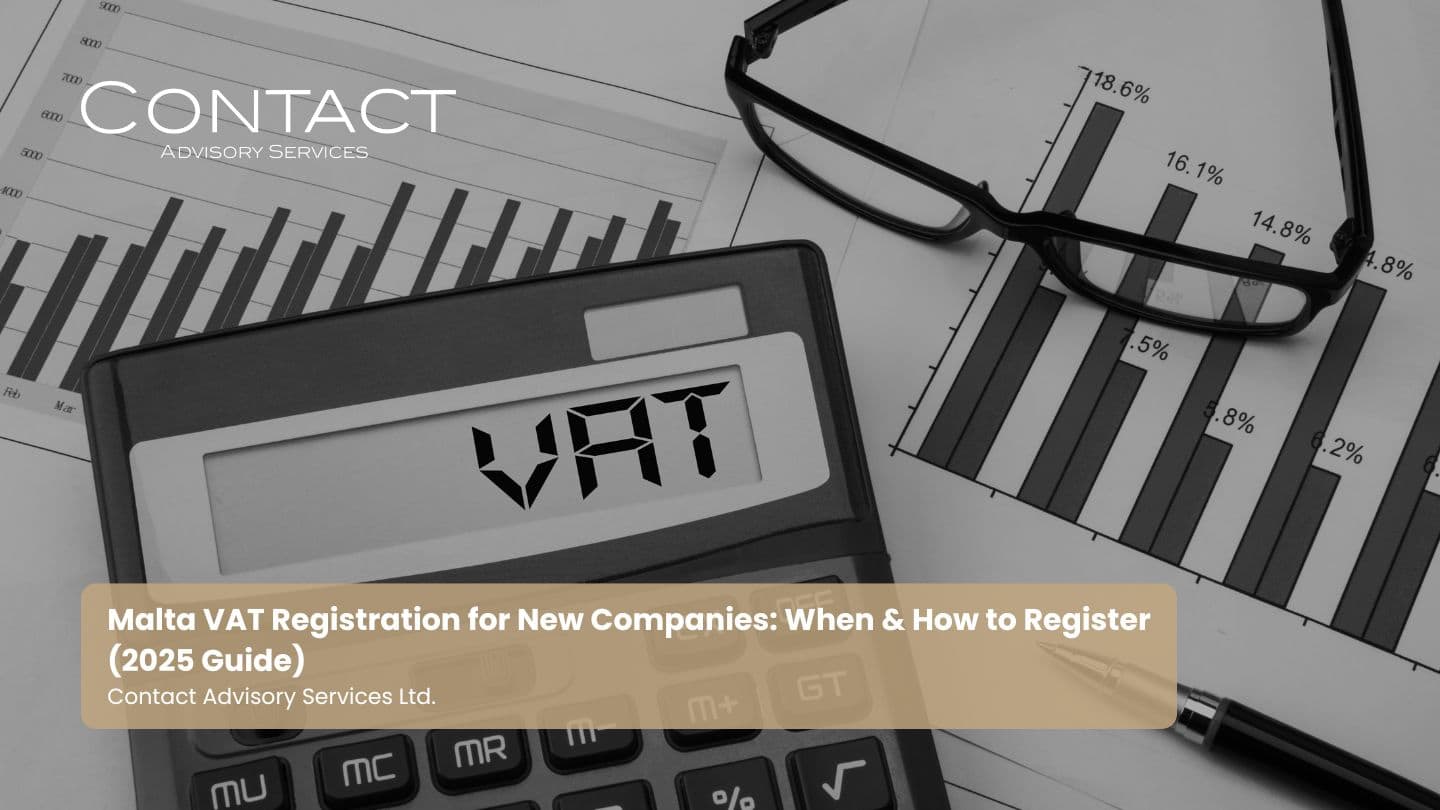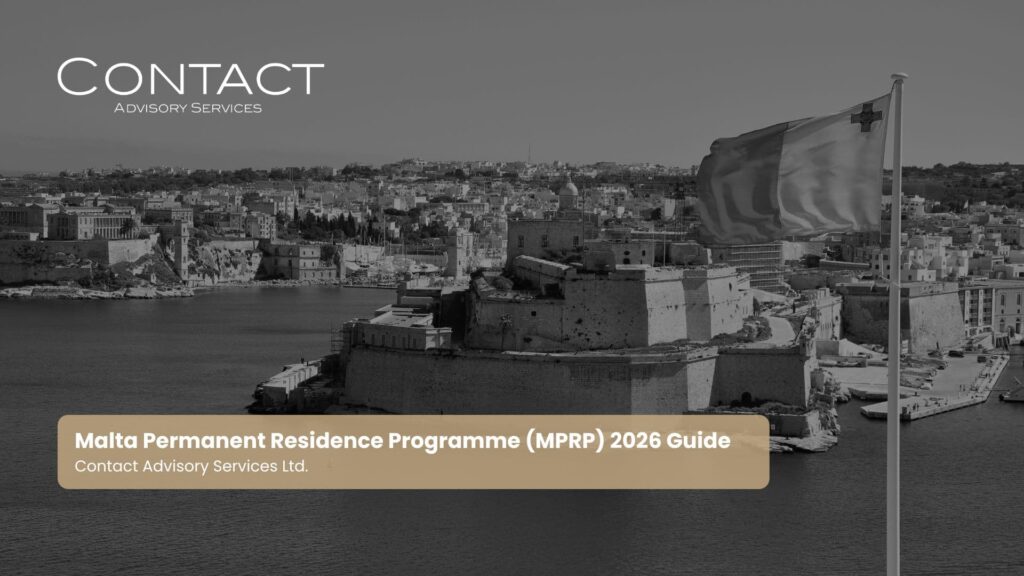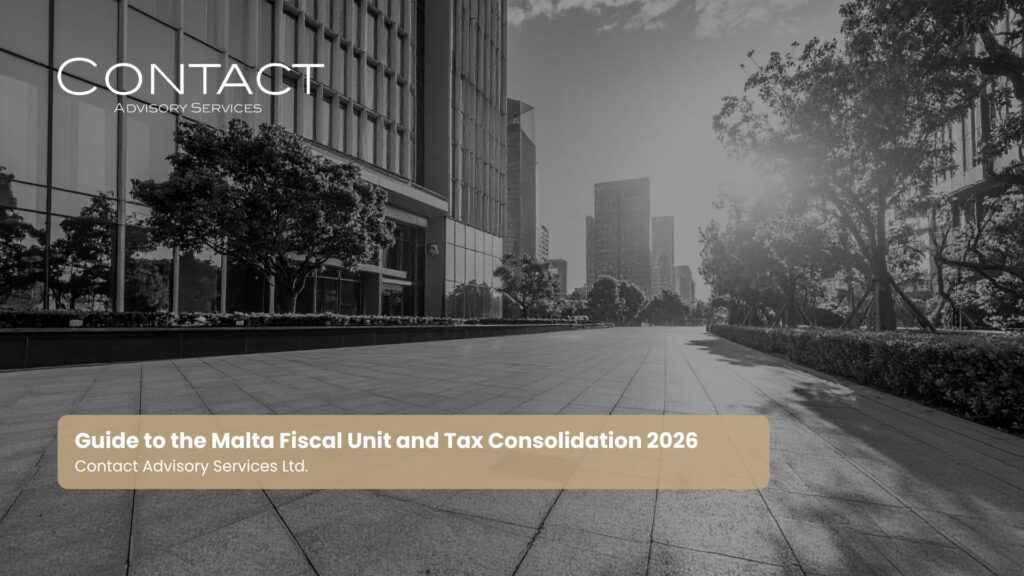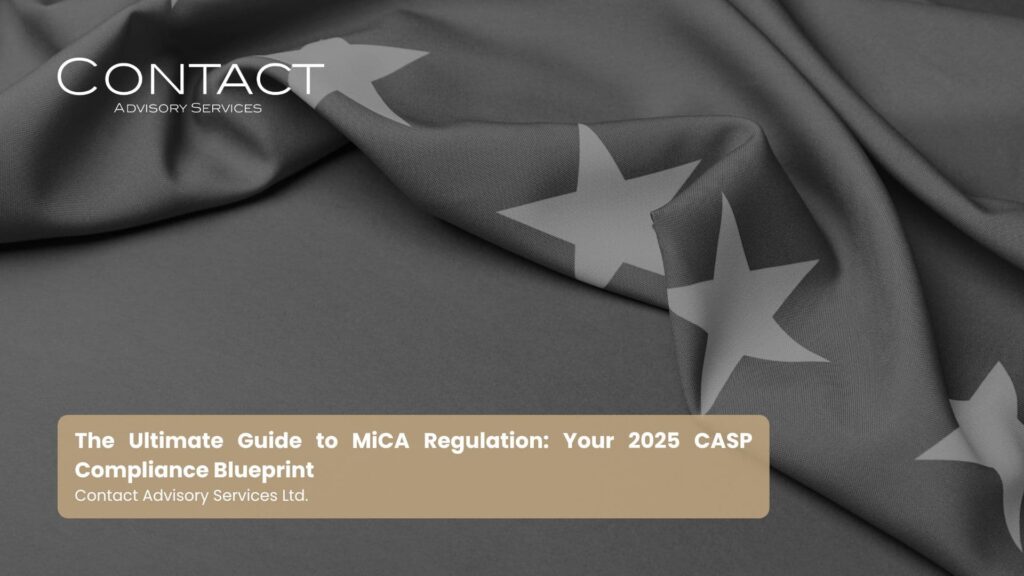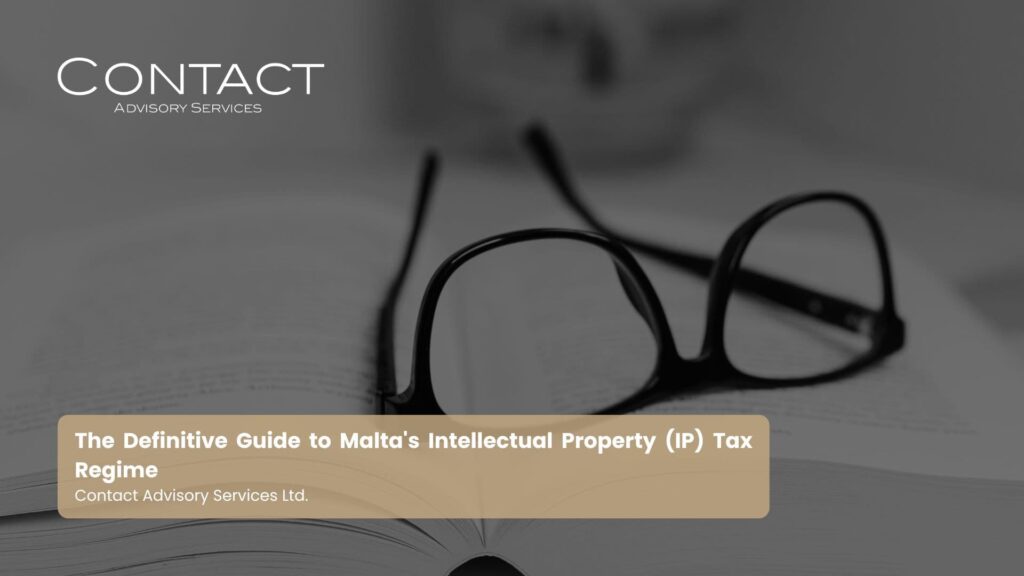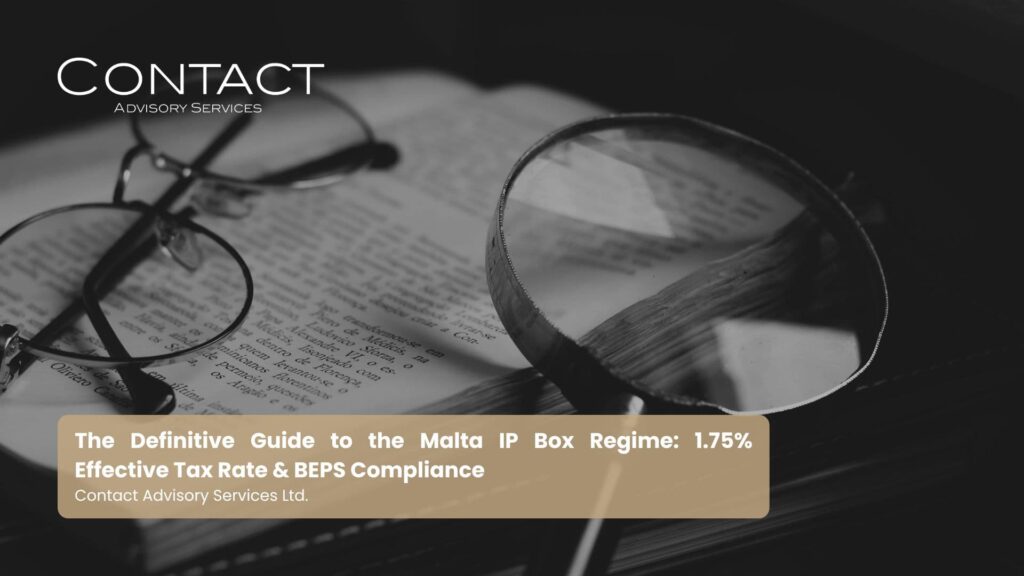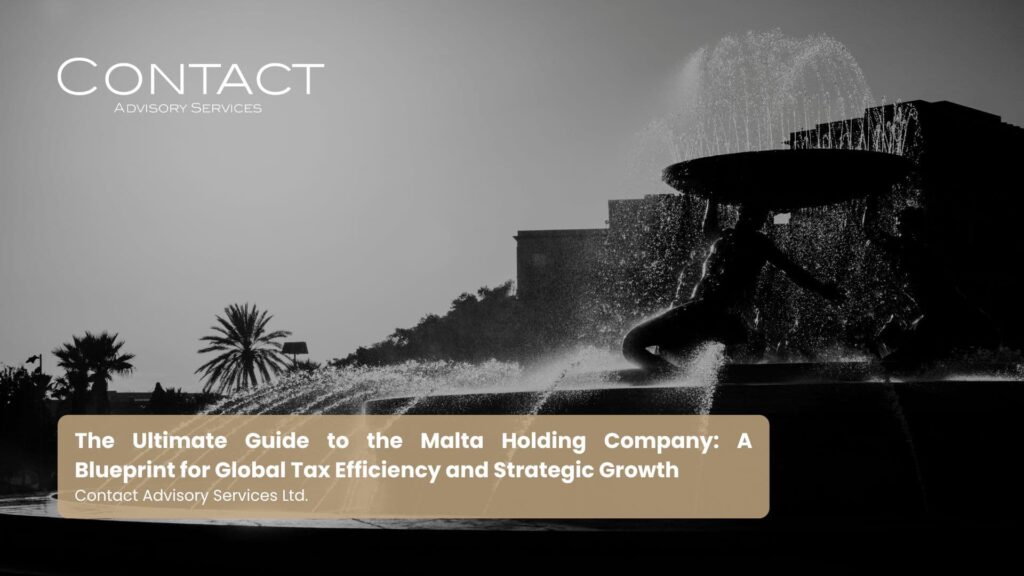A New Company’s Guide to VAT Registration in Malta – When and How?
Your new Maltese company is officially incorporated – a significant milestone achieved in your business journey! The excitement of Malta company formation is palpable. However, as the initial administrative dust settles, another critical compliance step looms: VAT (Value Added Tax) registration. For many entrepreneurs, especially those new to the Maltese or EU VAT system, questions immediately arise: “Do I need to register for VAT straight away?”, “What are the turnover thresholds?”, “What different types of VAT registration exist in Malta?”, and crucially, “How do I actually go about it?”
Understanding your VAT obligations from the outset is not just good practice; it’s a legal requirement that, if overlooked, can lead to complications and potential penalties. Getting VAT registration right – choosing the correct type and registering at the appropriate time – is fundamental to operating compliantly and efficiently in Malta and within the wider EU.
As seasoned corporate services consultants at Contact Advisory Services Ltd., we guide new businesses through the intricacies of Malta VAT registration every day. This article is designed to demystify the process for new companies. We’ll explore precisely when registration becomes mandatory, delve into the different types of VAT registration available (Articles 10, 11, and 12), outline the step-by-step application process, and highlight the key documentation you’ll need.
First, What Exactly is VAT in the Maltese Context?
Value Added Tax (VAT) is a consumption tax levied on most goods and services supplied by businesses in Malta. It’s also applicable to the importation of goods and certain acquisitions of goods and services from other EU member states. Businesses act as collectors of VAT on behalf of the Malta Commissioner for Revenue. They charge VAT on their taxable sales (output VAT) and can generally reclaim VAT incurred on their legitimate business purchases and expenses (input VAT).
The standard VAT rate in Malta is currently 18%, with reduced rates applying to certain specific supplies (e.g., 7% for qualifying accommodation, 5% for electricity, certain publications, etc.), and some supplies being zero-rated or exempt.
The “When”: Triggers for Mandatory VAT Registration in Malta
Not every new company needs to register for VAT from day one. The obligation to register primarily depends on the nature of your business activities and your expected turnover.
1. Exceeding Registration Thresholds (Article 10 Registration):
This is the most common trigger. A business (a “taxable person” carrying on an “economic activity”) must register for VAT under Article 10 of the Malta VAT Act if its annual turnover (excluding VAT) from taxable supplies is expected to exceed, or has exceeded, certain thresholds. These thresholds vary depending on the type of supply:
- Supplies of Goods: If your primary activity is supplying goods, the current annual turnover threshold is generally €35,000.
- Supplies of Services with Low Value-Added Inputs: For services where the value of inputs does not exceed 85% of the turnover (e.g., many professional services, consultancy), the annual turnover threshold is typically €30,000.
- Other Supplies of Services: For other services not falling into the above category (e.g., services with high-value inputs), the annual threshold is generally €14,000.
Important Note: These thresholds are subject to change by the authorities. It’s crucial to refer to the latest guidance from the Malta Commissioner for Revenue or consult with professionals like us at Contact Advisory Services Ltd.
Once your turnover is likely to exceed these thresholds within a 12-month period, you are obliged to register for VAT within 30 days of that determination. Failure to register on time can result in penalties.
2. Intra-Community Acquisitions of Goods:
If your Maltese company acquires goods from other EU member states, and the total value of these intra-community acquisitions exceeds €10,000 in a calendar year, you must register for VAT (typically under Article 11 if your main supplies are exempt, or Article 10 if you also make taxable supplies).
3. Receiving Services from Abroad (Reverse Charge Mechanism):
If your Maltese company (even if it makes exempt supplies locally) receives services from suppliers based outside Malta for which it is liable to account for VAT in Malta under the “reverse charge” mechanism, this can trigger a VAT registration obligation. The €10,000 threshold for intra-community acquisitions often also applies as an indicator for needing to register to account for such reverse charge VAT (typically under Article 11).
4. Distance Selling (to Malta):
Foreign businesses selling goods online to private consumers (B2C) in Malta may need to register for Maltese VAT if their sales exceed certain EU-wide thresholds (€10,000 for all EU distance sales). However, they might opt to use the One-Stop-Shop (OSS) scheme in their own member state instead of direct Maltese registration. For a new Maltese company selling to Maltese consumers, this would fall under the standard local thresholds.
5. Voluntary Registration:
Even if your turnover is below the mandatory thresholds, you can choose to voluntarily register for VAT under Article 10. This is often strategically advantageous, especially if your clients are predominantly VAT-registered businesses or if you incur significant input VAT on your purchases that you wish to reclaim.
Types of VAT Registration in Malta: Choosing the Right Article
Maltese VAT law provides for different types of registration, each with its own implications:
A. Article 10 Registration (Standard VAT Registration):
- Who is it for? Businesses whose turnover exceeds the mandatory thresholds, or those who opt for voluntary registration.
- Obligations: Charge VAT on taxable supplies, file periodic VAT returns (usually quarterly), make VAT payments.
- Benefits: Full right to reclaim input VAT incurred on business expenses and purchases related to their taxable supplies.
- This is the most common form of registration for active trading companies.
B. Article 11 Registration (Exempt Persons Making Certain Taxable Transactions):
- Who is it for? Businesses whose principal activities are exempt without credit (e.g., certain financial services, insurance, healthcare, education) BUT they:
- Make intra-community acquisitions of goods in Malta exceeding €10,000 per year, OR
- Are recipients of services from abroad on which they are liable to pay VAT in Malta under the reverse charge mechanism.
- Obligations: Account for VAT on their intra-community acquisitions or services received under reverse charge. File specific VAT declarations.
- Limitations: They generally cannot reclaim input VAT incurred on expenses related to their primary exempt without credit supplies. They can only reclaim input VAT directly attributable to their taxable intra-community acquisitions or services on which they paid reverse charge VAT.
C. Article 12 Registration (Small Undertakings / SMEs):
- Who is it for? Small businesses whose annual turnover does not exceed specific lower thresholds (e.g., currently €30,000 for services with low value inputs, or other thresholds such as €24,000 or €20,000 depending on the activity).
- Obligations: They are not required to charge VAT on their sales. They must issue fiscal receipts/invoices indicating they are an “exempt person – Article 12”. They must file an annual declaration.
- Limitations: They cannot reclaim any input VAT incurred on their purchases or expenses.
- Benefit: Administrative simplicity for very small businesses. They can be more price-competitive for non-VAT registered customers as they don’t add VAT.
- Opt-Out: Businesses eligible for Article 12 can choose to opt out and register under Article 10 instead if they wish to reclaim input VAT (e.g., if they have significant startup costs with VAT).
Choosing the correct article for your Malta VAT registration is crucial. At Contact Advisory Services Ltd., advising on the most appropriate VAT registration type is a key part of our initial Malta company setup consultation. For many new businesses aiming for growth and B2B transactions, Article 10 is often the preferred route, even if initially voluntary.
The “How”: Step-by-Step Process for VAT Registration in Malta
Once you’ve determined that you need (or want) to register for VAT, the application process is managed online via the Malta Commissioner for Revenue’s portal.
- Gather Required Documentation: Preparation is key. You’ll typically need:
- A copy of the company’s Certificate of Registration.
- A copy of the Memorandum & Articles of Association.
- Identification documents for the company director(s) signing the application (e.g., passport or Maltese ID card). Sometimes details of UBOs are also requested.
- A specimen signature of the director(s).
- A detailed description of the intended business activities (a brief business plan or summary). This helps the VAT Department understand the nature of your supplies.
- Projected annual turnover (to determine eligibility for thresholds).
- Bank account details (sometimes requested during the process or upon approval).
- A valid email address for official communications.
- Appoint a Tax Representative/Agent (Highly Recommended for Non-Residents/Complex Cases):
- While not always mandatory for Maltese entities, engaging a local tax representative or agent, like Contact Advisory Services Ltd., is highly advisable, particularly for non-resident directors or those unfamiliar with Maltese tax procedures. We can handle the entire application process on your behalf.
- Complete the Online Application Form:
- The application is submitted electronically via the Commissioner for Revenue’s online services portal.
- The form requires details about the company, its directors, its business activities, expected turnover, the type of registration being applied for (Article 10, 11, or 12), and banking details.
- Submission and Review by VAT Department:
- Once submitted, the VAT Department will review the application and supporting documents.
- They may request further information or clarifications. Prompt responses are crucial. From our experience, unclear business activity descriptions or incomplete documentation are common reasons for delays.
- Issuance of VAT Number:
- If the application is approved, the VAT Department will issue a Maltese VAT registration number. This number will typically have the prefix “MT”.
- You will also receive a Certificate of VAT Registration.
Timeline: The time taken for VAT registration can vary. Well-prepared applications for straightforward businesses can be processed relatively quickly (e.g., within a few days to a couple of weeks). However, more complex cases or applications requiring further clarification can take longer.
Post-Registration: Key VAT Obligations in Malta
Receiving your Malta VAT number is not the end of the journey. It marks the beginning of your ongoing VAT compliance obligations:
- Issuing Correct VAT Invoices: Ensure your invoices comply with Maltese VAT invoicing rules, showing your VAT number, the customer’s VAT number (for B2B EU transactions), the applicable VAT rate, and the amount of VAT charged.
- Filing Periodic VAT Returns: Most Article 10 registered businesses must file VAT returns quarterly. These returns declare your output VAT charged and input VAT claimed.
- Making VAT Payments: Any net VAT due must be paid to the Commissioner for Revenue by the deadline for the VAT return.
- Keeping Proper Records: Maintain detailed and accurate records of all sales, purchases, VAT invoices, and VAT returns for the statutory period (generally at least six years).
- Other Filings (if applicable): Recapitulative Statements for intra-EU supplies, Intrastat declarations for movement of goods above thresholds.
Non-compliance with VAT obligations can lead to interest charges, penalties, and audits. At Contact Advisory Services Ltd., we offer ongoing VAT compliance services to help businesses meet these obligations efficiently.
Benefits of Voluntary VAT Registration Under Article 10
For new companies whose turnover is initially below the mandatory thresholds, voluntarily registering under Article 10 can still be highly beneficial:
- Reclaim Input VAT: This is the primary advantage. You can reclaim VAT paid on your startup costs, equipment purchases, and ongoing operational expenses, improving cash flow.
- Business Credibility: Displaying a VAT number enhances your professional image, especially when dealing with other VAT-registered businesses (B2B). Many larger businesses prefer to deal with VAT-registered suppliers.
- Facilitates EU Trade: Essential for seamless B2B transactions with companies in other EU member states (e.g., applying the reverse charge on services, zero-rating intra-community supplies of goods).
The decision to register voluntarily should be based on a cost-benefit analysis, considering the administrative burden of compliance versus the potential input VAT recovery and business advantages.
Conclusion: Integrating VAT Registration into Your Maltese Business Strategy
VAT registration is a critical step that follows your Malta company formation. Understanding when your new Maltese company needs to register – based on turnover thresholds, the nature of its transactions (like intra-community acquisitions), or strategic choice – and how to navigate the online application process with the Malta Commissioner for Revenue is paramount.
Choosing the correct type of registration (Article 10 for full VAT rights, Article 11 for specific exempt scenarios, or Article 12 for small undertakings) has significant implications for your ability to charge VAT, reclaim input VAT, and your overall compliance burden. For many new businesses with growth ambitions and B2B dealings, an Article 10 registration, even if initially voluntary, often provides the most robust and flexible foundation.
Given the detailed documentation required and the nuances of the Maltese VAT system, seeking professional assistance from a firm like Contact Advisory Services Ltd. can streamline the registration process, ensure accuracy, and help you integrate VAT compliance seamlessly into your business operations from day one.
Are you planning to set up a new company in Malta and need expert guidance on your VAT registration obligations and application?
Get in touch with Contact Advisory Services Ltd. for a comprehensive consultation and dedicated support: info@contact.com.mt

